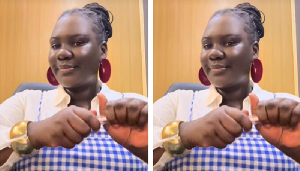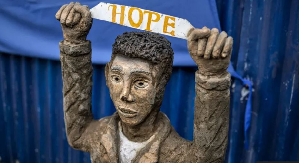In the light of the current economic situation of Ghana, given the opportunity, would stay or would you leave?
That was the incisive and troubling question that six high-powered speakers addressed last Friday 10th October as they argued for and against the motion at the Hot Kitchen debate, held at the Kofi Anan ICT Center before a live and online audience.
Speaking in favour of leaving the country were Samuel Owusu Darko, Jojo Quansah and Klenam Fiadzo. The debaters for staying in the country were John Armah, Ethel Delali Coffie and Adwoa Agyemang. The judges for the debate were Professor HK Prempeh, a Professor of Constitutional Law, Mr Ibrahim-Tanko Amidu, the Programme Manager of STAR-Ghana and Ms Chelsea Davis, a blogger.
Armah, leading the ‘stay team,’ said that despite the current economic challenges, young Ghanaians can still stay and make it in Ghana. According to him the ‘away team’s’ proposition amounted to leaving your sick mother behind to seek greener pastures. He declared that building Ghana does not begin by leaving your country for another.
Suggesting that Ghana’s problems are not insurmountable, Armah said “I can see Osagyefo Dr.kwame Nkrumah shedding tears. We can’t run away from our problems, we should confront them”. According to him, we must teach young people values such as character, boldness and integrity to fix Ghana’s problems.
Arguing for the ‘away team’ Fiadzo said he truly shared the view of Armah that we must all stay and build Ghana but asserts that the hustle in Ghana is real. Corruption is killing us, he added. Besides, he noted, freeze on public service hiring and high unemployment rate suggest one thing, ‘move if the kitchen is hot.’
Backing his claims, Fiadzo said, about a million Ghanaians have applied for the US visa lottery. To him, that means only one thing: people want to move out of the country. He also noted that doing business in Ghana is quite difficult with challenges including high interest rates.
He further noted that foreign remittances stood at $1.9 billion whiles Cocoa stood at $1.5 billion. This he argued is the benefit of moving out the country.
Delali, in her submission, noted that her side is not denying that there is no problem but cautioned against the idea of leaving the country when we all can do our bit to help build a strong nation. According to her, the problems in Ghana also determine the size of your opportunities. She also noted that the loss of human capital reduces economic growth in Africa. She pointed out that the impact of brain drain cannot be overemphasized.
Darko, on his part, noted that the Ghana cannot boast of any world class education center. He also argued that the world lately is interconnected and that the ‘home team’ is making a case made in the cold war era of “we verse them.” According to him, it is time to move if you have the access.
Adjoa on her part reemphasized the opportunities in Ghana. According to her, Ghana is a virgin island full of opportunities. She noted that Ghana has a resilient democracy and that we’ve had political power alternate between political parties.
In addition, she pointed out that foreign direct investments (FDI) are on the increase. Further, she revealed that, 20 percent of FDI to the West Africa region comes to Ghana. According to her, it takes our skills, talent and change in mindset and the pioneering spirit of Nkrumah to make things happened in Ghana.
Quansah, on his part, noted that when people move away, they are likely to contribute to import and cash remittances, whiles negatively affecting economic activity. Shockingly, he said, quoting from a World Bank paper that says “for each African person who moves away, there is an increase of $2,100 per annum in exports from that country of origin!” All this is beside the fact that there are potentially higher earnings accruing to the migrant in his/her new location, he added.
Justifying why people should move out if they get the opportunity to, Quansah said at the time the Asian “Tigers” were looking to make an economic leap, there was a number of deliberate state-supported migrations of the best minds.
According to him, some of the results are global giants such as HTC. In China, he added, this returnee breed of change makers actually forms what is known as the third generation of their entrepreneurship development (and very popular in their internet sector.)
Further, he noted that there are benefits for every developing nation’s citizens to move away and learn from the best in their fields. Also, he said, in the absence of a systematic state-supported programme, patriotic citizens are better off doing this not for themselves, but for the future of Ghana.
At the end of the debate, the panel of judges adjudged the away team as the winner of the debate.
General News of Tuesday, 14 October 2014
Source: Inform Ghana












